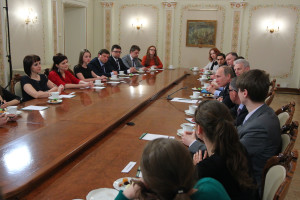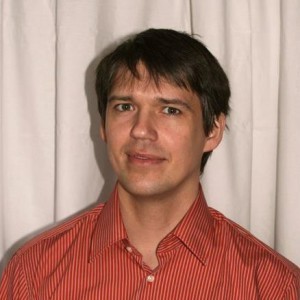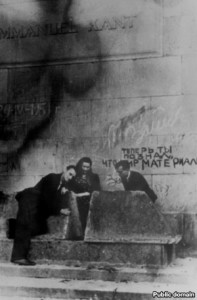D. Polyanskiy. About Kant Researchers and Kant Consumers
There are worse crimes than burning books. One of them is not reading them.
Ray Bradbury
On April 1, 2013 President of Russia Vladimir Putin made some statements that initiated a new wave of discussion of Kant’s role in Russia and in the Kaliningrad region. It all began when at the meeting with IKBFU delegation the President was sitting right opposite Yulia Mazur, post-graduate student and a research worker at Kant Institute.
Such position was very promising for Kant Institute, and the expectations were not disappointed. In his conversation with Yulia Vladimir Putin said among other things that «Kant can be and should be not only the symbol of your university, but in a way the symbol of the Kaliningrad region, or even more… we should consider what we can do in this regard on the federal scale».
When the government suggests doing something «on the federal scale» the whole vertical subordinate structure suddenly becomes active. Governor of the Kaliningrad region Nikolay Tsukanov was lightning-fast to react: «There is no doubt we have always felt Kant’s name is not used sufficiently. It is really a world brand that we could use effectively in the region today». Later Tsukanov announced that both federal and regional structures were assigned to develop the conception of the brand. (http://www.newkaliningrad.ru/news/community/k1901176.html)
Immanuil Kant is a brand? I am already hearing indignant voices of the fellow citizens: the authorities must have gone round the bend with all those brands. What does that even mean – «to use Kant’s name effectively»? This is what I would like to talk about.
 It is essential to differentiate Kant research and Kant consumption. We can research Kant or we can consume him. Kant-consumers use Kant in order to replenish their fat supplies. The renowned philosopher for them is just a symbolic bait image for attracting delicious tourist flows and investments. Kant researchers «eat» Kant differently. These weird people read his texts, try to understand his often complex conceptions and theories, and what’s even more weird, they compare their private and social lives with Kant’s ideas.
It is essential to differentiate Kant research and Kant consumption. We can research Kant or we can consume him. Kant-consumers use Kant in order to replenish their fat supplies. The renowned philosopher for them is just a symbolic bait image for attracting delicious tourist flows and investments. Kant researchers «eat» Kant differently. These weird people read his texts, try to understand his often complex conceptions and theories, and what’s even more weird, they compare their private and social lives with Kant’s ideas.
The dialectical connection between the two groups is obvious. Crumbs from the Kant-consumption table go to translations, research project, journals, conferences and lectures. And, vice versa, the better people know Kant as a person and a philosopher, the wider are the opportunities of using his name for marketing purposes.
The problem is that as of today the extensive growth of Kant consumption has run out of steam. In fact, what else can we do to “promote” our native “brand”? We have recreated the plate and the sculpture, constructed Kant’s bench, reconstructed the Cathedral with his tomb, organized the museum, named the federal university after him (which is a unique case in Russia) and shot movies about him. In any guide for the Kaliningrad region a story about Kant is an essential part of the content. We can develop a dozen conceptions, but there is not much where to go further. Really, we are not going to name villages, beer and football teams after Kant.
Another thing is the quality of consumption. To what extent are our officials, businessmen, guides, and other citizens familiar with the legacy of the German thinker? It is clear that Kant is somewhat a folklore figure.
But is it something more for Kaliningrad citizens than just a bunch of stereotypes? Is there more to “once upon a time a frail German professor lived in this town, he led boring and monotonous life, was endlessly moralizing, was hardworking, accurate and, of course, lonely”? How cautious are contemporary fellow-townsmen of the famous philosopher in their judgments? How often do they dare to use their own reason? What is it that they want from life – relative personal happiness at all costs or inner dignity that gives strength of mind in this ‘vale of misery’? Are they ready to have a constructive discussion with the Koenigsberg citizen or will there only be graffiti on walls?
Do they share Kant’s ‘religion within the bounds of bare reason’, his progressionism, pacifist and cosmopolitan beliefs? Do they have any conscious moral principles? Do they feel any connection whatsoever with the culture of trophy Koenigsberg?
Isn’t it where the only possible growth potential lies? In recent years Kant research was advancing at the expense of Kant consumption, but isn’t it time when Kant consumption may grow only with the help of educational efforts of Kant researchers? Hopefully, we, Kaliningrad citizens, are able to take the best that is left from Kant’s legacy, and I dare to think that this best rests in his books, not in his grave.
At the above mentioned meeting the President promised to help with publishing a new definitive edition of Kant’s collected works. I didn’t think that I would ever write such a thing, but in this matter I completely support President Putin! However, even if the edition will be published, it will still be esoteric, intellectually comprehensible only for a small circle of specialists. Contemporary Kant research faces an equally vital exoteric task – to make Kant’s legacy understandable and topical for a layman who is not prepared for reading complicated texts. In Russia, where popularization of science is in even bigger depression than science itself, such task seems almost impossible. Soviet institutes of popularization of science are destroyed and new ones are clearly insufficient. Perhaps, this is what we should keep in mind while developing federal and regional conceptions.






